“If a cluttered desk is a sign of a cluttered mind, then what are we to think of an empty desk?” ~Albert Einstein
I’ve written about my approach to world-building before, in general here, and in regards to names and naming here. But my friend Heather Reed recently undertook a new historical fantasy project, and she asked me specifically about my approach to researching the Broken Oaths trilogy. In looking back at my notes, I’m both excited for her and amazed.
Excited because they remind me of the adventure of the hunt, and the thrill of discovery. But amazed by the wide and disparate variety of sources that I mined for my story elements. In wading through what can only be called a disorganized mess, it’s a wonder that I was able to arrive at anything coherent.
This is one of the reasons I subscribe to the notion of a story muse. I’m the antithesis of organized, which seems contrary to being a good researcher. And yet somehow I was able to pull a story out of my intricate mess.
As an example, I give you my namey-namer cheat-sheet (see photo). It’s a simple 81/2” x 11” sheet of plain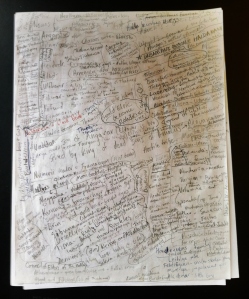 white paper that started out as a short list of possible character names. It’s now covered, front and back, with hundreds of names and obscure references. Please note there is very little means of organization, other than a handful of breakdowns by character group. And yet it continues to serve me well. I’m not sure how I find such a crazy resource helpful, but every time I need to check a name, this is my go-to reference. Honestly, I rarely need it. It’s mostly in issues such as: “Now what’s that secondary character’s grandmother’s name again?” And somehow I know what part of which side to look to find gramma’s name. This from a guy who honestly can’t recall his own phone number. Go figure.
white paper that started out as a short list of possible character names. It’s now covered, front and back, with hundreds of names and obscure references. Please note there is very little means of organization, other than a handful of breakdowns by character group. And yet it continues to serve me well. I’m not sure how I find such a crazy resource helpful, but every time I need to check a name, this is my go-to reference. Honestly, I rarely need it. It’s mostly in issues such as: “Now what’s that secondary character’s grandmother’s name again?” And somehow I know what part of which side to look to find gramma’s name. This from a guy who honestly can’t recall his own phone number. Go figure.
Getting Wet:
“Pearls do not lie on the seashore. He who desires one must dive.” ~Chinese Proverb
We’re in the information age, right? And with so much access to a mighty river of information, the toughest part is going to be finding the tributaries and offshoots that apply to your story. In order to do that, sticking your toe in will not do. You’re going to have to get wet.
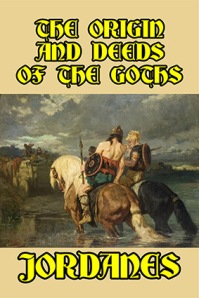 And you never know where the currents will carry you. For example, my quest for original source material about the Goths swiftly revealed a scarcity. Which is why I was so excited to find one of the few existing documents about the Goths by a Goth—Jordanes’ The Origin and Deeds of the Goths. Although I quickly realized Jordanes was writing about previous generations with few specific references and an obvious quantity of bluster, one note caught my attention and held it. He claimed that the Greek myth of the Amazons originated with the Ancient Greeks’ discovery of a group of Goth women whose husbands and sons had left them on the north shore of the Black Sea to raid in Persia and Egypt. I was fascinated, and it led to months of study of the Amazons and related myths and topics. And ultimately, to my creation of the Skolani—an all-female warrior sect that plays a prominent role in all of my work. All from a paragraph in an ancient treatise. There were no kickass warrior women on my radar at the onset, but oh-how-glad I am that I was willing to dive and found my way to them. They are most certainly a pearl.
And you never know where the currents will carry you. For example, my quest for original source material about the Goths swiftly revealed a scarcity. Which is why I was so excited to find one of the few existing documents about the Goths by a Goth—Jordanes’ The Origin and Deeds of the Goths. Although I quickly realized Jordanes was writing about previous generations with few specific references and an obvious quantity of bluster, one note caught my attention and held it. He claimed that the Greek myth of the Amazons originated with the Ancient Greeks’ discovery of a group of Goth women whose husbands and sons had left them on the north shore of the Black Sea to raid in Persia and Egypt. I was fascinated, and it led to months of study of the Amazons and related myths and topics. And ultimately, to my creation of the Skolani—an all-female warrior sect that plays a prominent role in all of my work. All from a paragraph in an ancient treatise. There were no kickass warrior women on my radar at the onset, but oh-how-glad I am that I was willing to dive and found my way to them. They are most certainly a pearl.
There’s a lot to take in, on most any subject. But it’s difficult to pick and choose your sources. I say dive in and let it wash over you. Go with the flow. You might end up somewhere you like.
Panning For Gold:
“The subconscious is a hundred times smarter than we are. We’re just taking dictation.” ~Steven Pressfield
In hindsight, I wish I’d worried less about delving for specifics. I wish I’d gone in with only the idea that I was going to educate myself and feed my enthusiasm, knowing the rest would more or less take care of itself. Because that’s what ended up happening.
As another example, in my research of the Goths, I began by broadly perusing subjects pertaining to the Germanic Tribes at the height of the Roman Empire. I studied their social structure and kingship. I went on to study their laws and mores, settlement layouts, agriculture, games and amusements, clothing and jewelry, migration (causes and effects), and their weapons and warfare. What I really wanted was more specific information about how they governed themselves. Sadly, there is little information, and much of it is conflicting.
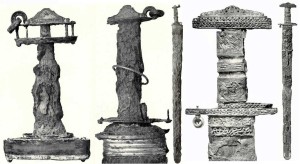 But in the course of my search, as I studied the last topic—weapons and warfare—I now see what became the roots of my solution. There is an entry in my notes from a book called Battle-ax People, by Olivia Vlahos. The note pertains to the expense and significance of swords, and how certain swords became important relics passed from father to son, occasionally symbolizing a legacy of chieftainship. From another book called The Everyday Life of Barbarians: Goths, Franks, and Vandals, by Malcom Todd, I note that some important swords are inscribed with oaths, and occasionally such oaths appeared in the form of rune rings, attached to the hilt. The two notes are only a few sentences each, and were taken several months apart. And yet they clearly led to the Futhark swords of the Gottari ruling clans—the symbolic relics which represent the leadership of my two ruling clans.
But in the course of my search, as I studied the last topic—weapons and warfare—I now see what became the roots of my solution. There is an entry in my notes from a book called Battle-ax People, by Olivia Vlahos. The note pertains to the expense and significance of swords, and how certain swords became important relics passed from father to son, occasionally symbolizing a legacy of chieftainship. From another book called The Everyday Life of Barbarians: Goths, Franks, and Vandals, by Malcom Todd, I note that some important swords are inscribed with oaths, and occasionally such oaths appeared in the form of rune rings, attached to the hilt. The two notes are only a few sentences each, and were taken several months apart. And yet they clearly led to the Futhark swords of the Gottari ruling clans—the symbolic relics which represent the leadership of my two ruling clans.
I don’t see any notation that I’d put the two together—inherited swords symbolic of leadership and rune rings on hilts—at the time. But when it came time to outline, a symbol was needed, and there they were: the Futhark swords. I invented much of the rest of the elements of their governance from other tidbits gleaned over the course of my research, and it all fell into place once I had the Futhark swords. So I’d advise you not to bother looking for bright baubles as you go. Just scoop it in. Your muse (or your subconscious) will sift through for the gems.
Take It From Me (Or Don’t):
It might seem silly, now that you’ve read this far, that a guy who admits he’s a disorganized and somewhat aimless researcher is now going to give you advice on researching. But I am (going to give advice, not silly—or is it both?). Take it or leave it. It’s all in good fun (as any research for fiction should be).
*Find your passion! As I say, this should be fun. If you’re passionate about your subject or era, your research will not only be easy, but a pleasure—something you’ll look forward to doing.
*Give yourself ENOUGH time, but not ENDLESS time. If you’re having fun researching, as you should, you might find a point of diminishing returns. At some point we all have to stop researching and start writing.
*Start online, but zero in with books. Nothing beats the internet for gaining a broader understanding of a topic or era. But you’ll soon realize that if you want any depth and citation, you need to go to books. I buy as many as I can, but for most of us, trips to the library become an indispensable part of any major research project.
*Don’t be afraid to follow the rabbit down the hole. I think I’ve pretty well illustrated this point. If you’re writing about Goths and Romans in the 4th Century AD, don’t be afraid to spend a few months chasing Amazons across Ancient Greece and beyond. Or something along those lines.
Let Your Brain Assist Your Heart:
“I’ve noticed this effect: When writers undertake to write a story, the insights and information they need to write it well tend to arrive unasked for. Those things arrive at the right moments, perfectly timed gifts from the story god.
Or, is it rather that an author’s brain, working on a story, begins to grab available information and synthesize it, which is to say bend, blend and meld it to the purposes of the story?
Is it magic, serendipity or synthesis? Whatever it is, I don’t think it’s accidental. I think authors make it happen. It’s the brain assisting the heart.” ~Donald Maass
Don’s quote above is from a comment he made on a wonderful WU post this week. The post is largely about the mysterious and seemingly random serendipity of the power of the brain, by Maureen Seaberg, the co-author of Struck by Genius. And, as he often does, for me Don took the post to a whole new level.
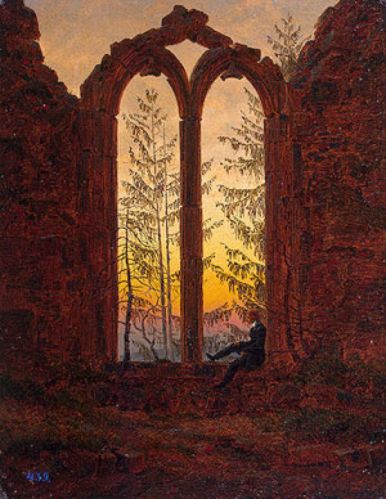 I allotted a year to research when I began my manuscript in earnest. And I ended up with a pile of notebooks even larger than the one pictured above. But once I started writing, I rarely dug through that disorganized mess (perhaps in part because it was disorganized). The insights and information I needed tended to arrive as perfectly timed gifts from the story god. Or did my brain somehow know better than my conscious self which bits to grasp and gather, to then “bend, blend and meld to the purposes of the story”? Either way, I’m glad I somehow found my way to allowing my brain to assist my heart.
I allotted a year to research when I began my manuscript in earnest. And I ended up with a pile of notebooks even larger than the one pictured above. But once I started writing, I rarely dug through that disorganized mess (perhaps in part because it was disorganized). The insights and information I needed tended to arrive as perfectly timed gifts from the story god. Or did my brain somehow know better than my conscious self which bits to grasp and gather, to then “bend, blend and meld to the purposes of the story”? Either way, I’m glad I somehow found my way to allowing my brain to assist my heart.
Moving forward, I’m hoping I can repeat the process, but I’m not too worried. I’ve already stumbled onto streams that have led my subconscious to begin the bending, blending and melding all over again.
Now it’s your turn. Is your research organized? Do your notebooks have color-coded tabs and an index? Do you trust that your brain will know better than your conscious self, and will assist your heart?
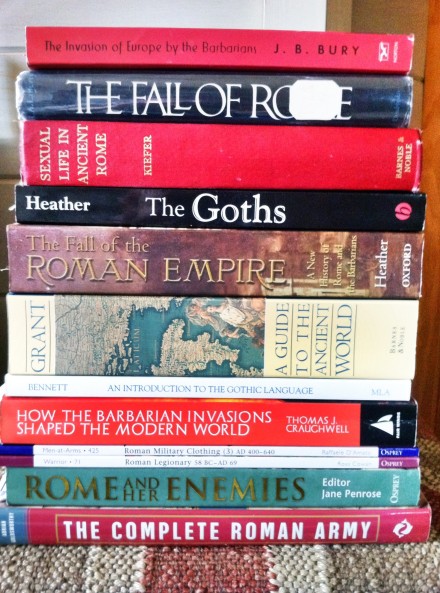
This is such a fun peek at your process, Vaughn. I’m always impressed by writers who do fantasy, because creating worlds is a daunting undertaking.
I’m so not a color-coded notebook kind of writer, but I do love to research, and I amass one big document stuffed with names, quotes, dates, landscape descriptions, and anything else I can think of. When I’m stuck, I tend to read it over a few times and somehow it always gets me going again.
LikeLike
Although I say I didn’t refer to the notes often, you’re right: just perusing a notebook can be a huge benefit–even from a morale standpoint. For me, it’s great to reinvigorate my excitement, and the research is a way to do just that.
Thanks for weighing in, Liz! Have a great weekend!
LikeLike
I love researching. Spent a lot of time looking at 3rd century Turkey which led to Visigoths, then Vikings, then early Christian church. Lots of things leading one to another and important facts of the age to know if I wanted it to seem realistic.
LikeLike
Hi Connie! What you’re describing is one of the most gratifying things about historical research–gaining a big picture understanding of an era. I love seeking a way to fit the various pieces together. Thanks for reading and for sharing your experience!
LikeLike
The research, too, gives you lots of opportunity for marketing to groups of people interested in that timeframe and location.
I do a lot of research for my nonfiction books on grieving the death of a friend: AIDS, 9/11, workplace grief, and most recently, on the military. I enjoy it. And I get bogged down in it eventually. There comes a point where I have to say “I have enough to start writing”.
And yes, I start on the internet: both for articles, organizations and people to interview. But the excitement I felt reading Civil War diaries at the New-York Historical Society, or talking to survivors of the World Trade Center attacks, cannot be duplicated online.
Unintentionally, I’ve become a bit of an expert, as you have, too. That adds to your credibility and will open a lot of doors for you down the road.
LikeLike
Good point about finding niches that can later be mined for marketing purposes. I know some writer’s who’ve leveraged their gained expertise into speaking engagements and guest articles. Wow, your experience with those diaries does sound spine-tingling. I love seeing original source material!
Thanks so much for offering your experience and for enhancing the conversation here, Victoria! Wishing you the best utilizing your expertise, as well!
LikeLike
Oh, the lovely, endless rabbit hole.
Our piles of notebooks and process are eerily similar. I once saw an interview with Rowling in which she pulled out all these notes from her HP series and it was disorganized beauty. I loved her all the more after that and realized that I didn’t have to try (or pretend) to be organized anymore. Saved me loads of time for the fun stuff, the real granola work. 🙂
Great post, V.
LikeLike
You’ve done my heart a lot of good with that Rowling story, too. This is the best kind of granola, isn’t it, Tonia? 🙂 Thanks so much, and have a great weekend!
LikeLike
That dictation quote by Pressfield, so true. Sometimes I read back on something I wrote and think: Where did that come from? Thanks for a peek into your research process and your passion Vaughn. I love that bit about the brain and the heart. I suspect the brain and the heart are the reasons runes were found on some of those swords you researched. The best leaders, like the incredible characters in your stories, were warrior/poets.
LikeLike
It’s very evident in reading Burning Lily that you both delve deeply and that you follow your heart, B. I was blown away by the layers of backstory that kept on coming as the novel progressed. Amazing stuff!
Yes, I think that those runes were often poetry – it’s how they made sense of the world. And, in a way, it’s how I do, too. Thanks so much, B! 🙂
LikeLike
I am somewhat disorganized with my own research for my own projects. I have notebooks all over the place with notes on a gazillion subjects. I have a drawer full of little bits of paper and cards and envelopes with story ideas (I’ll never get to them all). I have gathered and read a lot of books on the Welsh, Wales, and eastern PA coal mining. And when I was writing a fictional story (based on what I had heard about my great-grandfather), bam! an old newspaper article tidbit flashed across my brain – and it gave me the perfect ending for that short story. I hope more ideas pop up when they are needed.
LikeLike
Ah, you’ve got to love that kind of serendipity, don’t you, Karen? 🙂 I’m fascinated by Wales and the Welsh, even though I’m German and Dutch. There’s a real lure about the whole British Isles for me, and I’m not sure why. Glad to hear there’s another somewhat disorganized writer out there. And yet our brains still assist our hearts. 🙂 Thanks for weighing in, Karen!
LikeLike
Mae’r Gymraeg yn ddiddorol. Yr wyf hefyd yn astudio’r iaith. That’s Welsh for – The Welsh are fascinating. I am also studying the language.
I’m Welsh/Irish, with a smattering of Scandinavia, but I tend to lean on the Welsh side. I have loads of research – from family – and about 50 books on the people, culture, fiction by Welsh authors, coal, Welsh coal mining, eastern PA coal mining…my historical/memoir collection with be all about “that.”
LikeLike
It’s an interesting language, for sure. And, wow, that’s an impressive library! Looking forward to the read! 🙂 Have a great weekend, Karen!
LikeLike
I am amazed at the prospect of tackling such a mountain of a project! You’ve delved into the culture thoroughly. And about researching, everything you said is so right.
I’ve done a lot of research for my book, and in the process I’ve probably become an expert of Texas history. I got lost down the rabbit hole many times! While it can be tedious, I’ve discovered two things.
1. If you can’t find the facts to prove or disprove something, don’t worry about it, or just change the story.
2. Donald Maas is so right! I can’t tell you how many magical moments occurred during the process. It still gets me emotional to think back to a particular moment when I made a discovery.
My main character is based on a person (unknown name). All I knew about him was he lived on our ranch at one time. I invented his identity, background, nickname, etc. While doing research about a neighboring county, I discovered a man with the same nickname, living in similar circumstances, pursuing the same dream. I was so excited to see my instincts were right, but then I worried about people thinking I was writing about him!
I had to just let that worry go and move forward.
Thanks for this post. It’s rekindled my enthusiasm for the hunt.
LikeLike
You’re #1 discovery reminds me why I ended up writing historical *fantasy*. I gave me the excuse to really be free on the page. At first I was so afraid some ‘real scholar’ on Ancient Rome or the Germanics would call me out on some peripheral aspect, and all I wanted to get right was the story. I think I’m less worried about that now, but I’m still glad I went the fantasy route. 🙂
Your spooky serendipity is very cool, and very familiar. So many things I felt I’d “invented” ended up being very close to some historical fact I ran across afterward. It gives me goose-bumps every time.
Thanks for weighing in, Val, and so glad for the enthusiasm kindling. Having read your short stuff, I’m very much looking forward to reading your story! 🙂
LikeLike
[…] https://vaughnroycroftblog.com/2014/05/02/story-research-letting-the-brain-assist-the-heart/ […]
LikeLike
I am also so glad that you found your way to the Skolani warriors. I absolutely love them! Your tips for researching are spot-on in my opinion. Some of my favorite aspects of my story came from following the rabbit holes. However, I might have to zoom in on your name list and rewrite it in alphabetical order with color-coded bullets. 🙂 I am definitely a three-ring binder fanatic, tab user, and list re-re-writer. This seems a bit ironic since I start all of my stories in a very pantser style. Thanks for sharing!!
LikeLike
Hurray–another Skolani fan! 🙂 I can tell you’ve explored some very unique rabbit holes, Nicole, and you wove the various threads you found so brilliantly. And I do have my own Broken Oaths glossary, but it’s nowhere near as detailed (or disorganized) as my cheat-sheet. So I still use that same darn piece of paper. It’d be a shame if I spilled coffee on it, or something, wouldn’t it. Gosh, I shouldn’t even say such things–I’ll jinx myself.
Whether your system is a bit ironic or not, it’s clearly working for you! Keep it up! Hope you’re finally getting some springtime weather this weekend! Have a great week! 🙂
LikeLike
I absolutely love the research required for writing fantasy. My current novel has taken loads of research. Nearly every sentence had to be researched for one chapter, set in a historical setting in Central America. I learned a lot about the history of the area. I’ve also learned about black holes, supernovas, the birthing of stars and touched on several aspects of astrophysics. Absolutely fascinating. Fantasy must be thoroughly researched in order to be believable. To me, one of the most exciting parts of writing is the learning. Thanks for a great, inspiring article!
LikeLike
Wow -talk about a varied set of topics! That sounds like it’s going to be a brilliant read. 🙂 I wholeheartedly agree with every sentence of your comment, so thanks for weighing in. Best wishes with the new story!
LikeLike
My favorite part of research? When I find a ‘hole’ – I’ve read everything I can find, and the true information is either not recorded, or widely variable, and I can easily tweak the available stuff to fill the hole with what I want my story to do.
Just believe the disclaimer – this is fiction – because some of it will definitely be MY interpretation – and I am not writing genre fiction. I hope to make it so plausible, and so surrounded with stuff that is/might be true, that you won’t notice I’m possibly fibbing just a little there (wink).
Because this story couldn’t really happen, could it? Naw.
LikeLike
Plausible fibbing is just what we storytellers do, isn’t it, Alicia? Well, it’s what we strive for, I suppose. It’s like Neil Gaiman says: “Stories may well be lies, but they are good lies that say true things, and which can sometimes pay the rent.”
Keep on tweaking and fibbing. I’m guessing you’re nailing the plausibility. You always impress me with your insight over on the WU comment board. I’m honored that you stopped by. Thank you, and please come again!
LikeLike
Thanks – just signed up to follow your blog. I read somewhere (may have been a Travis McGee story) that the best lies are the ones where most of the story is true – it is hard to remember lies, and telling too many of them at once leads to the ‘Tangled Webs’ effect – where most people are found out.
The really good liars know exactly where their untruths are. The there’s the rest of the liars – but those don’t concern us, because they overdo it.
I actually have trails of lies through the novel-in-progress – if forced to I would show you how I justify each tiny piece. I refuse to lie to myself – but readers expect us to lie, and we don’t want to disappoint readers, do we?
LikeLike